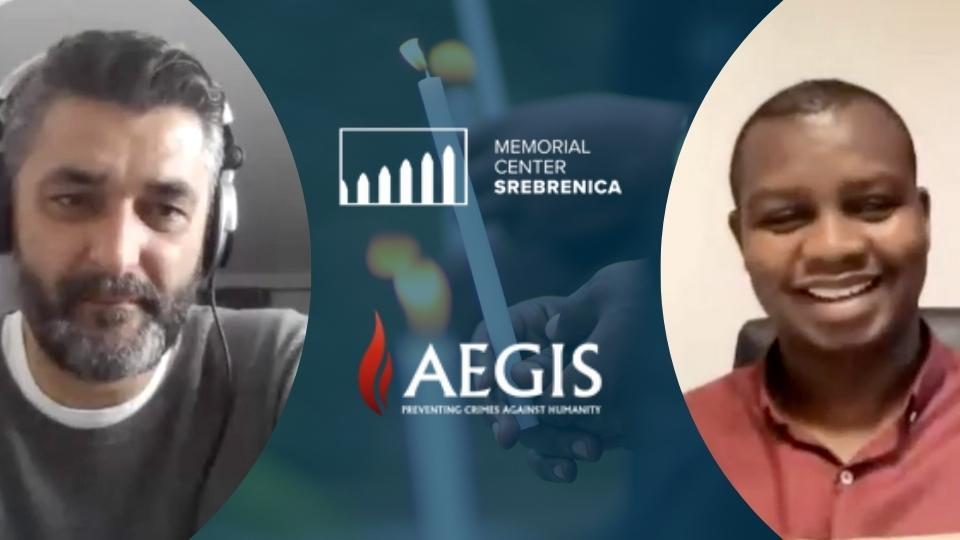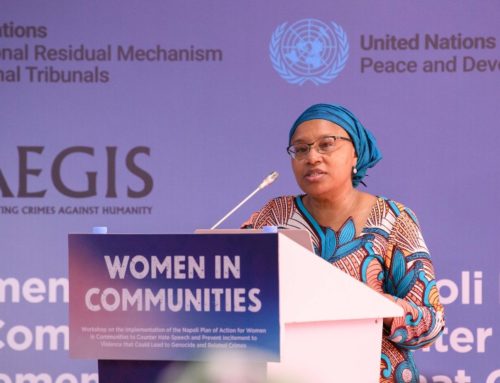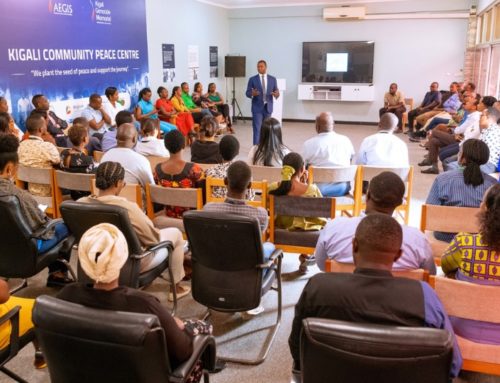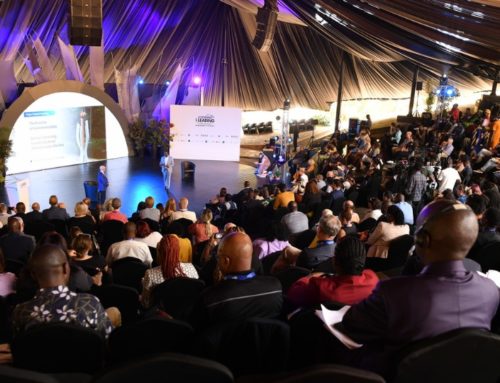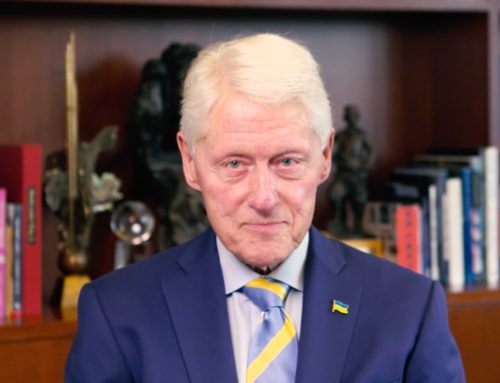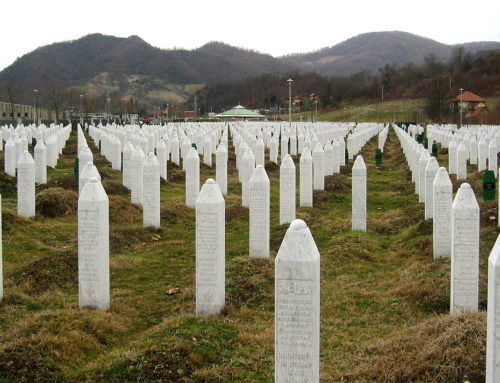The Aegis Trust and Srebrenica Genocide Memorial Centre have formalised a partnership for remembrance, education and the fight against genocide denial with announcement of a Memorandum of Understanding (MoU) building on their existing informal partnership.
The announcement was made on Sunday 21st November, the 26th anniversary of the Dayton Peace Accords which ended the Bosnian War, during the online event ‘A Bosnia-Rwanda Conversation: Quo Vadis Post Genocide?’ (which can now be viewed on demand here: www.bit.ly/bosnia-rwanda).
Reflecting on ‘Quo Vadis, Aida?’, the Oscar-nominated 2021 movie set during the fall of Srebrenica, the event featured Srebrenica Genocide Memorial Director Dr Emir Suljagić – who survived genocide at Srebrenica as a teenage translator for UN peacekeepers – and the Aegis Trust’s Executive Director Freddy Mutanguha, a survivor of the Genocide against the Tutsi, speaking from the Kigali Genocide Memorial. The discussion was moderated by Elmina Kulašić, Bosnia Director for Remembering Srebrenica UK.
Emir explained how the Srebrenica Memorial’s invitation for Aegis to sign an MoU was inspired by a conversation with the daughter of a prominent Holocaust survivor about how survivors of different genocides need to work together. “She said, ‘If we’re not there for each other, then what are we even doing?’,” he commented. “I’m looking forward to this cooperation, looking forward to us working together, ensuring that we both learn from each other, that we talk to each other, but more importantly, that we listen to each other.”
Freddy Mutanguha added, “The Srebrenica Genocide and the Genocide against the Tutsi were committed against humanity, and we are human beings, we are brothers and sisters; we are all together, we are all the same. So when we engage into this fight, we fight as one people to make sure that the truth is given, and to make sure that this doesn’t happen again, not only in Bosnia and Rwanda but also elsewhere in the world. So thank you for accepting to work with us. We are so happy and humbled to bring our efforts and put our hands together for this work.”
The first collaboration following the MoU will involve a podcast series by the Aegis Trust, ‘Peace at Risk in Bosnia’, for which Emir Suljagić has given a powerful interview to Aegis founder and CEO Dr James Smith.
“The chance to partner with the memorial in Srebrenica is a welcome opportunity for us at the Aegis Trust to fulfil our duty to stand with genocide survivors the world over,” James notes. “We are honoured that the Srebrenica Genocide Memorial Centre requested this partnership, and we look forward to a long and fruitful relationship. There are so many areas where our work intersects, and so many ways we can collaborate to counter the challenges of denial and the ideas which divide societies and lead to conflict. We are deeply aware how urgent those challenges are today.”
Elmina closed Sunday’s event by emphasizing that this is just the beginning: “This is really just a step in the direction that Emir and Freddy will take to keep the memory alive, to make sure that survivors voices are heard, and are at the table when it comes to changing the policies that are needed to make sure that genocide deniers are held responsible for the words that they use, because words are very powerful.”
Aegis Trust i Memorijalni centar Srebrenica udružuju snage u borbi protiv negiranja genocida
Aegis Trust i Memorijalni centar Srebrenica formalizirali su partnerstvo u oblasti obrazovanja, komemoracije i borbe protiv negiranja genocida najavivši Memorandum o razumijevanju, koji se temelji na njihovom već postojećem neformalnom partnerstvu.
Informacija je objavljena u nedjelju, 21. novembra, na 26. godišnjicu Dejtonskog mirovnog sporazuma kojim je okončan rat u BiH, tokom online događaja „Razgovor o BiH i Ruandi: Quo Vadis poslije genocida?“ (koji je sada dostupan ovdje: www.bit.ly/bosnia-rwanda).
Uz osvrt na film „Quo Vadis, Aida?“, koji je bio nominiran za Oskara 2021. i čija se radnja odvija tokom pada Srebrenice, na događaju su učestvovali direktor Memorijalnog centra Srebrenica dr. Emir Suljagić, koji je preživio genocid u Srebrenici kao mladi prevodilac za mirovne snage UN-a, i izvršni direktor Aegis Trusta Freddy Mutanguha, preživijeli genocida nad Tutsijima, koji se javio iz Memorijalnog centra u Kigaliju. Diskusiju je moderirala Elmina Kulašić, državna direktorica za BiH organizacije Remembering Srebrenica UK.
Suljagić je objasnio kako je poziv Memorijalnog centra Srebrenica upućen Aegis Trustu da potpišu Memorandum o razumijevanju bio inspirisan razgovorom sa kćerkom istaknutog preživjelog holokausta o tome kako preživjeli različitih genocida moraju da rade zajedno. Tokom razgovora je rekla: „Ako nismo tu jedni za druge, šta onda zapravo radimo?“. „Radujem se ovoj saradnji, radujem se što ćemo biti u prilici da učimo jedni od drugih, da razgovaramo jedni s drugima, i, što je još važnije, da slušamo jedni druge.”
Freddy Mutanguha je dodao: „Genocid u Srebrenici i genocid nad Tutsijima počinjeni su protiv čovječanstva, a mi smo ljudska bića, mi smo braća i sestre; svi smo zajedno, svi smo isti. Stoga, kada se uključimo u ovu borbu, borimo se kao jedan narod za to da osiguramo da se istina zna i da se to više ne ponovi, ne samo u BiH i Ruandi nego bilo gdje u svijetu. Zato vam hvala što ste prihvatili da sarađujete s nama. Veoma smo sretni i počašćeni što smo udružili snage u ovom radu.”
Prva saradnja nakon potpisivanja Memoranduma o razumijevanju će biti na serijalu podcasta Aegis Trusta pod nazivom „Mir u opasnosti u BiH“, u okviru kojeg je Emir Suljagić dao dojmljiv intervju osnivaču i glavnom izvršnom direktoru Aegis Trusta, dr. Jamesu Smithu.
“Prilika da sarađujemo sa Memorijalnim centrom Srebrenica je za nas u Aegis Trust-u odlična prilika da ispunimo svoju dužnost da budemo uz preživjele genocida širom svijeta”, napominje Smith. “Počašćeni smo što je Memorijalni centar Srebrenica zatražio ovo partnerstvo i radujemo se dugoj i plodonosnoj saradnji. Postoji toliko područja u kojima se naš rad dodiruje i toliko načina na koje možemo sarađivati kako bismo se suprotstavili izazovima negiranja genocida i idejama koje dovode do podjela u društvu i izazivaju sukobe. Duboko smo svjesni toga, koliko su ti izazovi danas gorući.”
Elmina Kulašić je zaključila nedjeljni razgovor naglasivši da je ovo samo početak: „Ovo je zapravo samo korak u smjeru kojim će Emir i Freddy ići kako bi očuvali sjećanje, kako bi se pobrinuli za to da se glasovi preživjelih čuju i da budu uključeni u razgovore o promjeni politike koja je potrebna kako bi se osiguralo da negatori genocida budu pozvani na odgovornost za riječi koje koriste, jer su riječi vrlo moćne.”

